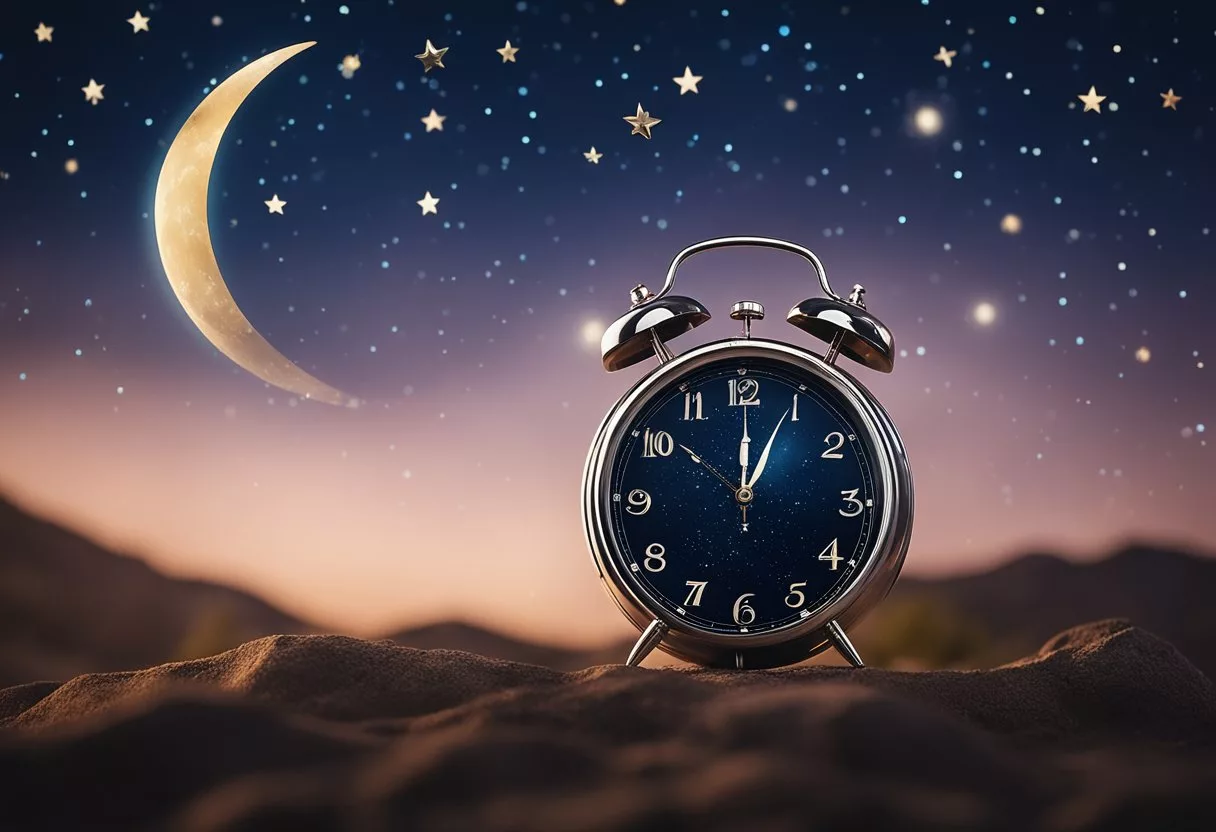Melatonin is a popular sleep aid used by many people to help with sleep issues. It’s a hormone that our bodies make naturally, but some take it as a supplement. While it’s generally safe, taking too much can lead to problems.

What to do before bed to sleep better:
Watch the video NOW!
Taking too much melatonin can cause side effects like headaches, nausea, and excessive sleepiness. These effects are usually not life-threatening, but they can be uncomfortable and disrupt your daily life. It’s important to use the right amount of melatonin to avoid these issues.
The right dose of melatonin varies for each person. It depends on factors like age, weight, and sleep problems. Using the lowest dose that works for you is the best approach. This helps prevent taking too much and keeps you safe.
Key Takeaways
- Melatonin can cause side effects if taken in high doses
- The right melatonin dose varies for each person
- It’s best to use the lowest effective dose of melatonin
Understanding Melatonin and Its Uses

Melatonin is a hormone that plays a crucial role in regulating sleep patterns. It is produced naturally in the body and is also available as a supplement.
Role in the Sleep-Wake Cycle
Melatonin is made by the pineal gland in the brain. This hormone helps control the body’s circadian rhythm, which is the internal clock that guides sleep and wake times.
The body’s melatonin levels rise in the evening as it gets dark. This signals to the body that it’s time to sleep. Levels then drop in the morning when exposed to light, helping people wake up.
Factors like jet lag, shift work, or certain health conditions can disrupt this natural cycle. This can lead to sleep issues and insomnia for some people.
Common Uses of Melatonin Supplements
Melatonin supplements are often used to help with sleep problems. They are available over-the-counter as a dietary supplement in many countries.
Common uses include:
- Treating short-term insomnia
- Adjusting sleep schedules for jet lag
- Helping shift workers regulate their sleep
Melatonin may also be used in sleep medicine to treat certain circadian rhythm disorders. It’s important to note that while melatonin can be helpful, it’s not a cure-all for all sleep issues.
The typical dose ranges from 1 to 5 milligrams, taken about 30 minutes before bedtime. However, it’s best to consult a doctor for personalized advice on using melatonin supplements.
Potential Risks of Melatonin Overdose

Taking too much melatonin can lead to unwanted effects. While rarely life-threatening, a melatonin overdose may cause discomfort and health issues.
Short-Term Side Effects
Excessive sleepiness is a common result of taking too much melatonin. People may feel groggy or have trouble waking up the next day.
Headaches and dizziness can occur. Some individuals report feeling nauseous or even vomiting after a high dose.
Mood changes are possible. Irritability and confusion may set in, making it hard to think clearly.
Nightmares or vivid dreams might disturb sleep. This can lead to poor rest quality.
In rare cases, allergic reactions may happen. Signs include:
- Skin rashes
- Itching
- Tightness in the chest
- Trouble breathing
Long-Term Health Implications
Regular high doses of melatonin may affect hormone balance. This can disrupt natural sleep cycles over time.
Blood pressure changes are possible. Some people experience lower blood pressure, which can be risky for those with heart conditions.
Daytime fatigue may become chronic. This can impact work, school, and daily activities.
Long-term use of high doses might mask underlying sleep disorders. This delay in proper diagnosis could lead to worsening health issues.
Interactions with medications may occur. Blood thinners and diabetes drugs are examples of medicines that can be affected.
Appropriate Melatonin Dosage and Safety
Melatonin dosages vary based on age and individual needs. Using the right amount at the proper time is key for safety and effectiveness.
Safe Dosages by Age and Weight
For adults, 0.5 mg to 5 mg of melatonin is generally considered safe. Most people don’t need more than 3 mg.
Children may need lower doses. A pediatrician can recommend the right amount based on a child’s age and weight.
Older adults might be more sensitive to melatonin. They should start with a low dose of 0.5 mg.
It’s best to begin with the lowest dose and increase slowly if needed. This helps avoid side effects.
Tips for Safe Melatonin Use
Take melatonin 1-2 hours before bedtime. This timing helps match the body’s natural melatonin release.
Don’t use melatonin with other medications without checking with a doctor or pharmacist first.
Avoid taking melatonin every night for long periods without talking to a healthcare provider.
Store melatonin safely out of reach of children. Choose a reliable brand with third-party testing.
Stop using melatonin if side effects occur. These may include daytime drowsiness or headaches.
Interactions and Contraindications

Melatonin can interact with various medications and lifestyle factors. These interactions may change how melatonin works in the body or increase the risk of side effects.
Medication Interactions
Melatonin can interact with several types of medications. Certain antidepressants may raise melatonin levels in the body. This can lead to increased drowsiness or other side effects.
Blood thinners like warfarin may be affected by melatonin. Patients taking these drugs should talk to their doctor before using melatonin supplements.
Some seizure medications can lower melatonin levels. This may reduce the supplement’s effectiveness for sleep.
Diabetes medications might be impacted by melatonin use. Blood sugar control could be affected, so careful monitoring is important.
Melatonin and Lifestyle Factors
Alcohol can increase melatonin’s sedative effects. Combining the two may lead to excessive drowsiness and impaired coordination.
Caffeine can counteract melatonin’s sleep-promoting effects. It’s best to avoid caffeine for several hours before taking melatonin.
Smoking may lower natural melatonin levels in the body. This could impact the effectiveness of melatonin supplements.
Bright light exposure, especially from screens, can interfere with melatonin’s effects. Limiting screen time before bed may improve results.
Responding to Melatonin Overdose

Knowing how to spot and react to a melatonin overdose is key. Quick action can help manage symptoms and prevent issues.
Recognizing Overdose Symptoms
Melatonin overdose can cause several symptoms. These may include:
- Extreme drowsiness
- Headaches
- Nausea or stomach pain
- Dizziness
- Anxiety or irritability
Some people might also have:
- Changes in blood pressure
- Confusion
- Vivid dreams or nightmares
It’s important to note that symptoms can vary. They may be mild or severe depending on the amount taken.
Immediate Actions and Treatment
If someone has taken too much melatonin, there are steps to take:
- Call Poison Control at 1-800-222-1222 for advice.
- Stay calm and monitor symptoms.
- If symptoms are severe, go to the emergency room.
Treatment often focuses on managing symptoms. Doctors might:
- Give activated charcoal to absorb excess melatonin
- Provide IV fluids for hydration
- Treat specific symptoms as needed
In most cases, melatonin overdose is not life-threatening. But it’s always best to seek help from a healthcare provider.
Regulatory Information and Quality Control
Melatonin regulations and quality control vary worldwide. Different countries have different rules for how melatonin is sold and made.
FDA Regulations and Oversight
In the United States, the Food and Drug Administration (FDA) treats melatonin as a dietary supplement. This means it’s not as tightly controlled as prescription drugs.
The FDA doesn’t check if melatonin products are safe or work well before they’re sold. Companies that make melatonin must follow good manufacturing practices.
They also have to make sure their labels are correct. But the FDA doesn’t test every product. This can lead to problems with product quality.
International Standards and Quality
Other countries have different rules for melatonin. In the European Union, melatonin is often treated as a medicine. This means it’s more tightly controlled.
In Japan and Australia, melatonin is only available with a prescription. These countries have stricter quality control measures.
Some places use third-party testing to check melatonin products. This helps make sure the products are pure and have the right amount of melatonin.
Quality control is important for melatonin. Some studies have found that melatonin products don’t always contain what their labels say. This can make it hard for people to know how much they’re really taking.
Melatonin Research and Studies

Scientists have conducted many studies on melatonin’s effects. This research helps us understand how melatonin works and its potential benefits and risks.
Clinical Studies and Findings
Melatonin can help people fall asleep faster and improve sleep quality. Studies show it’s useful for jet lag and shift work sleep problems.
Experts found melatonin may reduce daytime sleepiness in some people. It can also help with certain sleep disorders.
Research suggests melatonin is generally safe for short-term use. But some studies report side effects like vivid dreams or next-day grogginess.
The Mayo Clinic notes that melatonin can cause mild anxiety or confusion in rare cases.
Ongoing Research and Future Directions
Scientists are studying melatonin’s effects on sleep during the COVID-19 pandemic. They want to know if it can help with stress-related sleep issues.
Researchers are looking at how melatonin interacts with melatonin receptors in the brain. This could lead to new sleep aids with fewer side effects.
Studies are exploring melatonin’s long-term safety. They aim to find the best doses for different age groups and conditions.
Some experts think melatonin might work well with cognitive behavioral therapy for insomnia. More research is needed to confirm this idea.
Conclusion
Taking too much melatonin can lead to unwanted effects. While not typically dangerous, an excessive dose may cause side effects like headaches and drowsiness.
Melatonin is generally safe when used as directed. The recommended dose is between 0.2 and 5 mg for most adults. Higher amounts don’t necessarily improve sleep and may actually disrupt it.
It’s important to start with a low dose and increase slowly if needed. Checking with a doctor before using melatonin is wise, especially for those with medical conditions or taking other medications.
Proper melatonin use can support healthy sleep patterns. But it’s not a cure-all for sleep issues. Good sleep habits and addressing underlying causes of sleep problems are key.
Melatonin supplements should be stored safely away from children. Accidental ingestion can occur, though serious harm is unlikely.
For the best results, use melatonin as part of a broader sleep strategy. This includes maintaining a regular sleep schedule and creating a relaxing bedtime routine.
Frequently Asked Questions

Melatonin use can have potential risks and side effects. It’s important to understand proper dosages, symptoms of overdose, and how it affects different age groups.
Can you overdose on melatonin, and what are the symptoms?
Yes, it is possible to take too much melatonin. Symptoms of a melatonin overdose may include excessive sleepiness, stomach problems, and headaches.
Other signs can be irritability, mild tremors, and feelings of confusion or disorientation.
Are there any serious risks associated with taking 100 mg of melatonin?
Taking 100 mg of melatonin is an extremely high dose and can lead to more severe side effects. This amount is far above the recommended safe dosage range.
Potential risks include changes in blood pressure, vivid dreams or nightmares, and daytime drowsiness that can impair daily activities.
What is considered a safe dose range for melatonin in adults?
For adults, a safe starting dose of melatonin is typically between 0.2 and 5 mg. It’s best to start with the lowest effective dose.
Individual responses to melatonin can vary, so it’s important to consult with a healthcare provider to determine the right dose.
What should you do in the event of a suspected melatonin overdose?
If someone suspects a melatonin overdose, they should seek medical attention. It’s important to contact a healthcare provider or poison control center immediately.
While waiting for medical help, the person should stay calm and provide information about the amount of melatonin taken and any symptoms experienced.
How does melatonin use affect children and what are the signs of an overdose?
Melatonin can affect children differently than adults. Signs of melatonin overdose in children may include excessive sleepiness, nausea, and changes in mood or behavior.
Parents should be cautious and consult a pediatrician before giving melatonin to children, as dosages for kids are typically lower than for adults.
What are the possible negative side effects of using melatonin on a nightly basis?
Regular use of melatonin may lead to side effects such as daytime drowsiness, headaches, and changes in sleep patterns.
Some people may experience mood changes, dizziness, or mild anxiety. Long-term nightly use might also affect the body’s natural melatonin production.